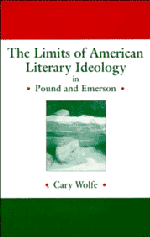Summary
When I first began work on this study, I was fortunate enough to have at my disposal two superb research libraries, one at Duke and one at Chapel Hill. But neither collection, I soon discovered, included a hard copy of Ezra Pound's Jefferson and/or Mussolini – an eclectic and disturbing text that was central to Pound, crucial to my understanding of him, but little known outside Poundian circles and often marginalized within them. Eventually, as dumb luck would have it, I stumbled upon a copy in the political science section of a local used-book store whose main holdings, it seemed, were in gardening and science fiction. It would be easy, of course, to overread the politics of this curious little episode, but let me suggest that the eventual conclusions we might reach about its significance would likely reproduce one of the two dominant modes of Pound criticism in the past forty years: the conspiracy theory, which imagines that the traditional Pound industry has engaged in a more or less conscious suppression of the embarrassingly political Pound (who is distilled in texts tike Jefferson and/or Mussolini), the better to defend the supposedly autonomous work of the poet; and the autonomy-of-art theory of those who would so conspire.
My characterization of the situation is obviously schematic, but it serves to illustrate my larger point: that critics who would engage Pound's work find themselves framed from the outset by a kind of critical cold war, one that forces them into something resembling the role of Marc Antony at the funeral in Julius Caesar.
- Type
- Chapter
- Information
- Publisher: Cambridge University PressPrint publication year: 1994
- 1
- Cited by

